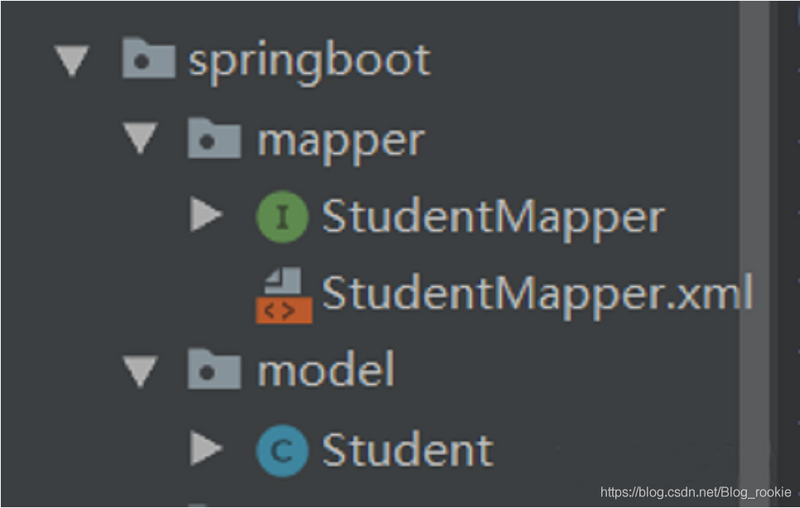您好,登录后才能下订单哦!
使用Spring Boot Mybatis 怎么实现一个反向工程?相信很多没有经验的人对此束手无策,为此本文总结了问题出现的原因和解决方法,通过这篇文章希望你能解决这个问题。

如果使用 高版本 , 驱动类变为:com.mysql.cj.jdbc.Driver
url 后面应该加属性 nullCatalogMeansCurrent=true ,否则生成有问题
当前版本 MySQL 数据库为 5.7
主要根据注释来修改自己的内容
<?xml version="1.0" encoding="UTF-8"?> <!DOCTYPE generatorConfiguration PUBLIC "-//mybatis.org//DTD MyBatis Generator Configuration 1.0//EN" "http://mybatis.org/dtd/mybatis-generator-config_1_0.dtd"> <generatorConfiguration> <!-- 指定连接数据库的 JDBC 驱动包所在位置,指定到你本机的完整路径 --> <classPathEntry location="E:\Java\tool\maven_repository\mysql\mysql-connector-java\5.1.9\mysql-connector-java-5.1.9.jar"/> <!-- 配置 table 表信息内容体,targetRuntime 指定采用 MyBatis3 的版本 --> <context id="tables" targetRuntime="MyBatis3"> <!-- 抑制生成注释,由于生成的注释都是英文的,可以不让它生成 --> <commentGenerator> <property name="suppressAllComments" value="true"/> </commentGenerator> <!-- 配置数据库连接信息 --> <jdbcConnection driverClass="com.mysql.jdbc.Driver" connectionURL="jdbc:mysql://localhost:3306/springboot" userId="root" password="123456"> </jdbcConnection> <!-- 生成 model 类,targetPackage 指定 model 类的包名, targetProject 指定 生成的 model 放在 IDEA 的哪个工程下面--> <javaModelGenerator targetPackage="com.md.springboot.model" targetProject="src/main/java"> <property name="enableSubPackages" value="false"/> <property name="trimStrings" value="false"/> </javaModelGenerator> <!-- 生成 MyBatis 的 Mapper.xml 文件,targetPackage 指定 mapper.xml 文件的 包名, targetProject 指定生成的 mapper.xml 放在 IDEA 的哪个工程下面 --> <sqlMapGenerator targetPackage="com.md.springboot.mapper" targetProject="src/main/java"> <property name="enableSubPackages" value="false"/> </sqlMapGenerator> <!-- 生成 MyBatis 的 Mapper 接口类文件,targetPackage 指定 Mapper 接口类的包 名, targetProject 指定生成的 Mapper 接口放在 IDEA 的哪个工程下面 --> <javaClientGenerator type="XMLMAPPER" targetPackage="com.md.springboot.mapper" targetProject="src/main/java"> <property name="enableSubPackages" value="false"/> </javaClientGenerator> <!-- 数据库表名及对应的 Java 模型类名,有几个表写几个table --> <table tableName="t_student" domainObjectName="Student" enableCountByExample="false" enableUpdateByExample="false" enableDeleteByExample="false" enableSelectByExample="false" selectByExampleQueryId="false"/> </context> </generatorConfiguration>
此时会报错,如下

这个时候可以不用理会,项目也是会正常运行的
Spring Boot 理论+实战系列教程大家看这个:
<build> <plugins> <!--mybatis 代码自动生成插件--> <plugin> <groupId>org.mybatis.generator</groupId> <artifactId>mybatis-generator-maven-plugin</artifactId> <version>1.3.6</version> <configuration> <!--配置文件的位置--> <configurationFile>GeneratorMapper.xml</configurationFile> <verbose>true</verbose> <overwrite>true</overwrite> </configuration> </plugin> </plugins> </build>

自动生成model/Student、实体类
以及StudentMapper,接口
StudentMapper.xml 具体对数据库的操作
这样方便我们使用,具体的下面详细介绍,注意看注释

Student
package com.md.springboot.model;
public class Student {
private Integer id;
private String name;
private Integer age;
public Integer getId() {
return id;
}
public void setId(Integer id) {
this.id = id;
}
public String getName() {
return name;
}
public void setName(String name) {
this.name = name;
}
public Integer getAge() {
return age;
}
public void setAge(Integer age) {
this.age = age;
}
}StudentMapper
package com.md.springboot.mapper;
import com.md.springboot.model.Student;
public interface StudentMapper {
int deleteByPrimaryKey(Integer id);
int insert(Student record);
int insertSelective(Student record);
Student selectByPrimaryKey(Integer id);
int updateByPrimaryKeySelective(Student record);
int updateByPrimaryKey(Student record);
}StudentMapper.xml
<?xml version="1.0" encoding="UTF-8"?>
<!DOCTYPE mapper PUBLIC "-//mybatis.org//DTD Mapper 3.0//EN" "http://mybatis.org/dtd/mybatis-3-mapper.dtd">
<mapper namespace="com.md.springboot.mapper.StudentMapper">
<!--
数据库字段名称 实体对象属性名称
user_name userName
user_age userAge
-->
<!--
如果数据表中的字段是多个单词构成的,通过Mybatis逆向工程生成的对象属性名称
会按照驼峰命名法的规则生成属性名称
自己设计数据表的时候,多个单词之前使用下划线分隔
-->
<!--
resultMap的作用
1. 当数据库中的字段名称和实体类对象的属性名不一致,可以进行转换
2. 当前查询的结果对象没有对应一个表时,可以自定义一个结果集
-->
<resultMap id="BaseResultMap" type="com.md.springboot.model.Student">
<!--
id标签只能修饰主键字段,result标签修饰其他字段
column 数据库中的字段名称
property 映射对象的属性名称
jdbcType 对应的类型
-->
<id column="id" jdbcType="INTEGER" property="id" />
<result column="name" jdbcType="VARCHAR" property="name" />
<result column="age" jdbcType="INTEGER" property="age" />
</resultMap>
<!--sql语句片段,将公共部分抽出-->
<sql id="Base_Column_List">
id, name, age
</sql>
<select id="selectByPrimaryKey" parameterType="java.lang.Integer" resultMap="BaseResultMap">
select
<include refid="Base_Column_List" />
from t_student
where id = #{id,jdbcType=INTEGER}
</select>
<delete id="deleteByPrimaryKey" parameterType="java.lang.Integer">
delete from t_student
where id = #{id,jdbcType=INTEGER}
</delete>
<insert id="insert" parameterType="com.md.springboot.model.Student">
insert into t_student (id, name, age
)
values (#{id,jdbcType=INTEGER}, #{name,jdbcType=VARCHAR}, #{age,jdbcType=INTEGER}
)
</insert>
<!--动态sql-->
<insert id="insertSelective" parameterType="com.md.springboot.model.Student">
insert into t_student
<trim prefix="(" suffix=")" suffixOverrides=",">
<if test="id != null">
id,
</if>
<if test="name != null">
name,
</if>
<if test="age != null">
age,
</if>
</trim>
<trim prefix="values (" suffix=")" suffixOverrides=",">
<if test="id != null">
#{id,jdbcType=INTEGER},
</if>
<if test="name != null">
#{name,jdbcType=VARCHAR},
</if>
<if test="age != null">
#{age,jdbcType=INTEGER},
</if>
</trim>
</insert>
<update id="updateByPrimaryKeySelective" parameterType="com.md.springboot.model.Student">
update t_student
<set>
<if test="name != null">
name = #{name,jdbcType=VARCHAR},
</if>
<if test="age != null">
age = #{age,jdbcType=INTEGER},
</if>
</set>
where id = #{id,jdbcType=INTEGER}
</update>
<update id="updateByPrimaryKey" parameterType="com.md.springboot.model.Student">
update t_student
set name = #{name,jdbcType=VARCHAR},
age = #{age,jdbcType=INTEGER}
where id = #{id,jdbcType=INTEGER}
</update>
</mapper>看完上述内容,你们掌握使用Spring Boot Mybatis 怎么实现一个反向工程的方法了吗?如果还想学到更多技能或想了解更多相关内容,欢迎关注亿速云行业资讯频道,感谢各位的阅读!
免责声明:本站发布的内容(图片、视频和文字)以原创、转载和分享为主,文章观点不代表本网站立场,如果涉及侵权请联系站长邮箱:is@yisu.com进行举报,并提供相关证据,一经查实,将立刻删除涉嫌侵权内容。